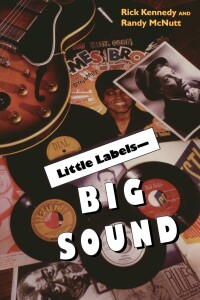 Some of the most important and influential American music has been put out by small independent labels. And it’s no accident that it’s also some of the best and most authentic American music, from Delta and Chicago blues to bebop jazz, from gospel and soul to rockabilly.
Some of the most important and influential American music has been put out by small independent labels. And it’s no accident that it’s also some of the best and most authentic American music, from Delta and Chicago blues to bebop jazz, from gospel and soul to rockabilly.
The corporate music machine, with its huge overhead, stultifying bureaucracy and need to make lots of money, rarely takes a chance on any kind of new music. The risky, the daring, the fringe music created by artists who are ahead of their time, has traditionally been the provenance of “indie” labels, whose owners are in it for their love of music, rather than to make a fortune.
It should be no surprise, then, that some of music’s biggest innovators of the 20th Century, from James Brown to Charley Parker to Elvis Presley, were initially recorded on small labels.
Little Labels—Big Sound documents the contributions to American popular music by 10 labels. These little enterprises, owned by small-time entrepreneurs and lovers of quirky music, have done much to nurture music that the bulk of the public wasn’t quite ready for at the time. Charley Parker, Blind Lemon Jefferson, Mac Rabennack (Dr. John), Cowboy Copas, and Presley himself, all were popular with specialized audiences or in small regions before they hit the big time. These little labels supported them, helped them grow and develop their chops, or sometimes simply keep body and soul together, until they were ready for the big time.
And in some cases, such as James Brown, Roy Orbison, and Kris Kristofferson, the independent label was their home for nearly their entire career.
Each of the book’s ten chapters tells the story of one of these independent record companies and its artists: Gennett (Louis Armstrong, Bix Beiderbecke, Hoagy Carmichael), Paramount (Charley Patton, Lemon Jefferson, Ma Rainey), Dial (Charlie Parker, Dizzy Gillespie), King (James Brown, Grandpa Jones, Little Willie John), Duke-Peacock (Big Mama Thornton, Little Richard, Johnny Ace), Sun (Presley, Perkins, Cash, Lewis, et al.), Riverside (Charley Byrd, Wes Montgomery, Cannonball and Nat Adderly), Ace (Dr. John, Guitar Slim, Huey Smith), Monument (Orbison, Kristofferson), and Delmark (Junior Wells, Magic Sam, Roscoe Mitchell).
The story of every label is pretty much the story of one man and his obsession. His vision, if you will. Whether it was Sam Phillips looking for something new among the black blues singers and white country singers of Memphis, or Sydney Nathan of King Records, who hated James Brown’s hyper-emotional soul shouting but recognized its vitality and commercial potential, these men stuck to their dreams. They lost their shirts just as often as they succeeded, but that never dimmed their enthusiasm for the music.
A couple of seasoned music journalists, Kennedy and McNutt have done a hefty amount of research into both the label owners and the musicians. Their prose rarely sings with the same kind of gusto as the artists they’re writing about, but it’s always clear and uncluttered.
In addition to the main section on the companies themselves, there’s a good appendix with bibliography and recommended labels for reissue anthologies; and an introduction that gives a good overview of the book and its themes. A forward by Al Kooper suffers the fate of most forwards — you won’t miss much if you skip it.
The music made by many of these artists survives on records, tapes and compact discs. Books have been written about them, and movies made about many of them. But in many cases, their careers would have ended before they began without the help of the independent labels and their owners. These visionary businessmen performed a valuable service to 20th Century popular music by bringing this music to the public, and the authors and publishers of this little book have performed a similar service by compiling and preserving that history.
(Indiana University Press, 1999)
